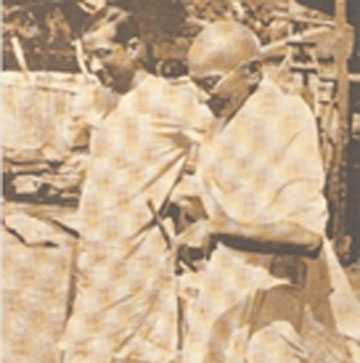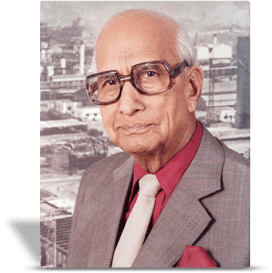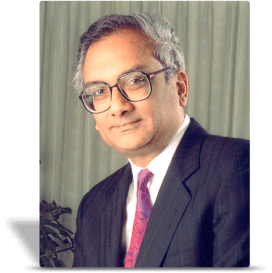Mr. Ghanshyam Das Birla
The roots of the Aditya Birla Group date back to the 19th century in the picturesque town of Pilani set amidst the Rajasthan desert. It was here that Seth Shiv Narayan Birla started trading in cotton, laying the foundation for the House of Birla.
Through India's arduous times of the 1850s, the Birla business expanded rapidly. In the early part of the 20th century, the Group's founding father, Mr. Ghanshyam Das Birla, set up industries in critical sectors such as textiles and fibre, aluminium, cement, and chemicals. As a close confidant of Mahatma Gandhi, he played an active role in the Indian freedom struggle. He represented India at the first and second round-table conferences in London, along with Gandhiji. It was at Birla House in Delhi that the luminaries of the Indian freedom struggle often met to plot the downfall of the British Raj.
Mr. Ghanshyam Das Birla found no contradiction in pursuing business goals with the dedication of a saint, emerging as one of the foremost industrialists of pre-independence India. The principles by which he lived were soaked up by his grandson, Mr. Aditya Vikram Birla, the Group's legendary leader.

Ghanshyam Das Birla with Mahatma Gandhi
Mr. Aditya Vikram Birla
A formidable force in Indian industry, Mr. Aditya Birla dared to dream of setting up a global business empire at the age of 24. He was the first to put Indian business on the world map, as far back as 1969, long before globalisation became a buzzword in India.
In the then vibrant and free market South East Asian countries, he ventured to set up world-class production bases. He had foreseen the winds of change and staked the future of his business on a competitive, free market driven economic order. He put Indian business on the global stage, 22 years before economic liberalisation was formally introduced by the former Prime Minister, Mr. Narasimha Rao, and the former Union Finance Minister, Dr. Manmohan Singh. He set up 19 companies outside India, in Thailand, Malaysia, Indonesia, the Philippines and Egypt.
Interestingly, for Mr. Aditya Birla, globalisation meant more than just geographic reach. He believed that a business could be global even while being based in India. Therefore, back in his home-territory, he drove single-mindedly to put together the building blocks to make our Indian business a global force.
Under his stewardship, his companies rose to be the world's largest producer of viscose staple fibre, the largest refiner of palm oil, the third-largest producer of insulators and the sixth-largest producer of carbon black. In India, they attained the status of the largest single producer of viscose filament yarn, apart from being a producer of cement, grey cement, and rayon grade pulp. The Group is also the largest producer of aluminium in the private sector, the lowest first-cost producers in the world and the only producer of linen in the textile industry in India.
At the time of his untimely demise in 1995, the Group's revenues had crossed Rs.8,000 crore globally, with assets of over Rs.9,000 crore, comprising 55 benchmark quality plants, an employee strength of 75,000 and a shareholder community of 600,000.
Most importantly, his companies earned the respect and admiration of the people, as one of India's finest business houses, and the first India-based international Group. Through this outstanding record of enterprise, he helped create enormous wealth for the nation, and respect for Indian entrepreneurship in South East Asia. In his time, his success was unmatched by any other industrialist in India.
That India attains respectable rank among the developed nations was a dream he forever cherished. He was proud of India and took equal pride in being an Indian.
My vocation is to strive continuously, to reach excellence in all spheres of management, by weaving the threads of enterprise, knowledge, experience, ideas and tasks into a fabric that can be called 'management'.



